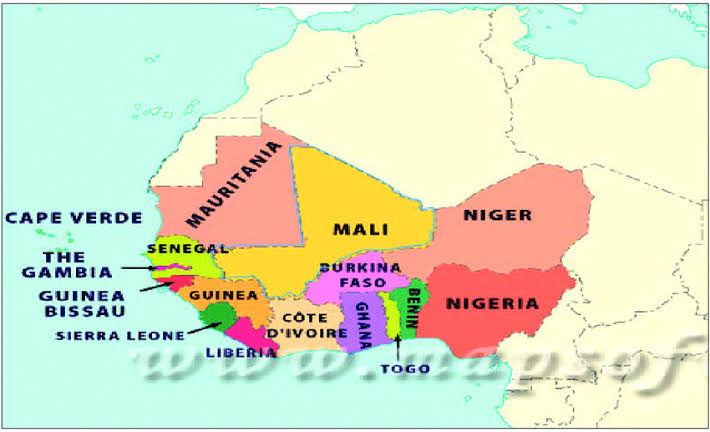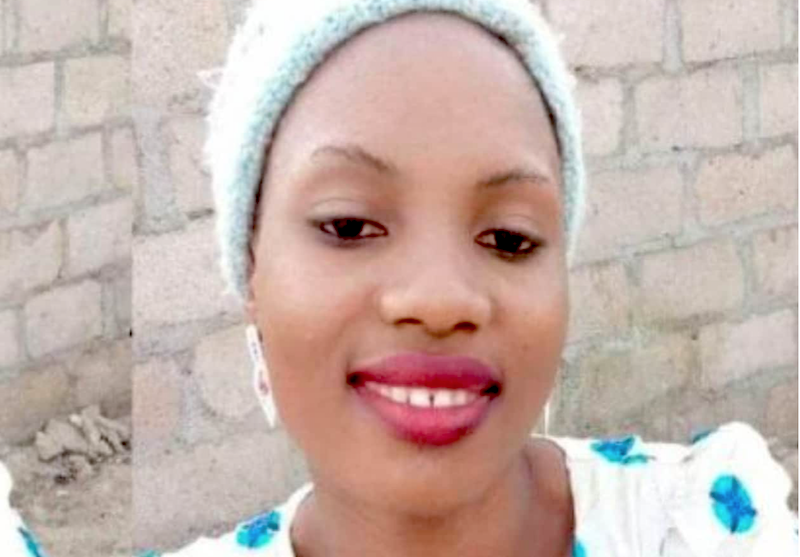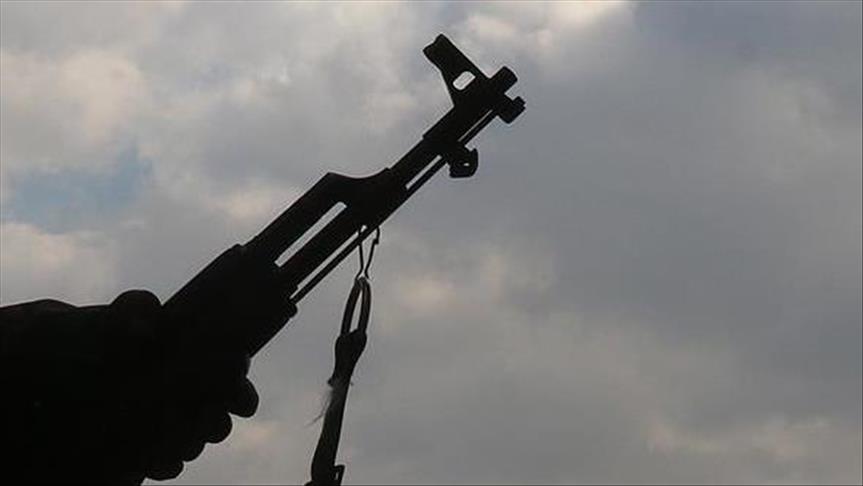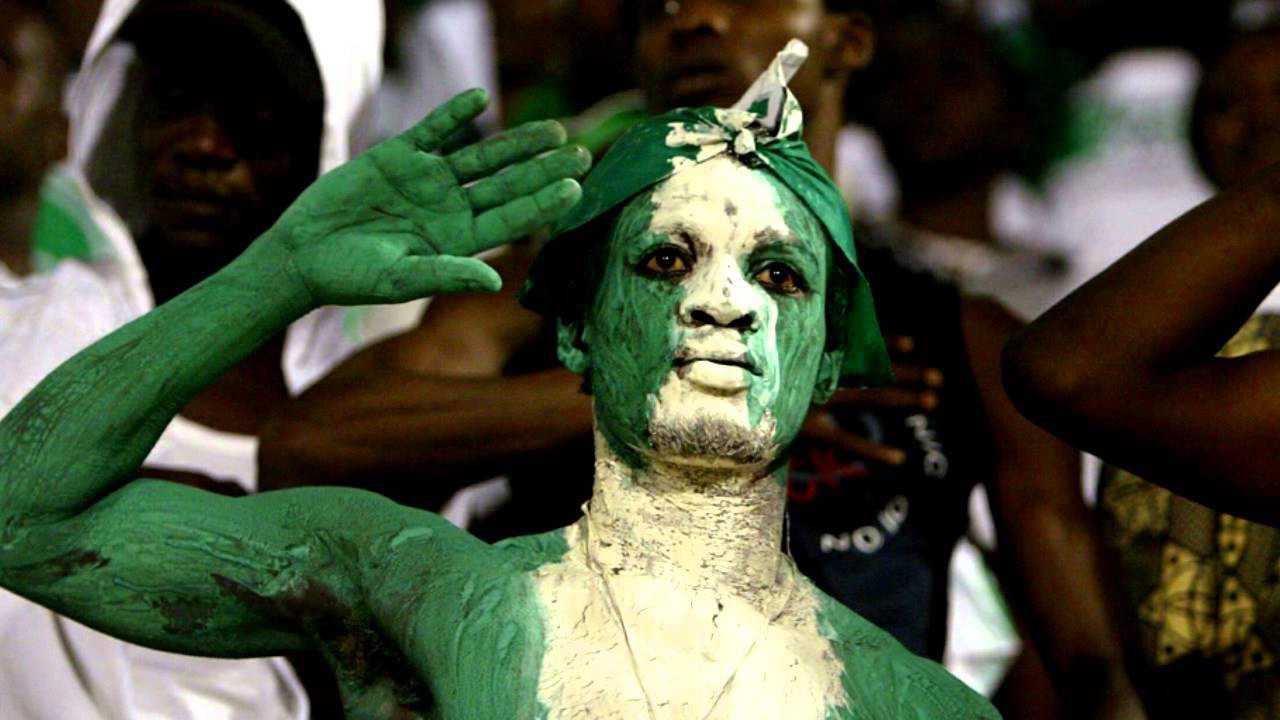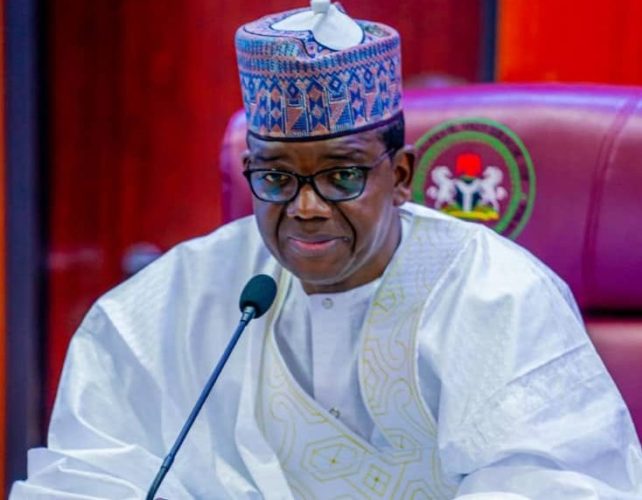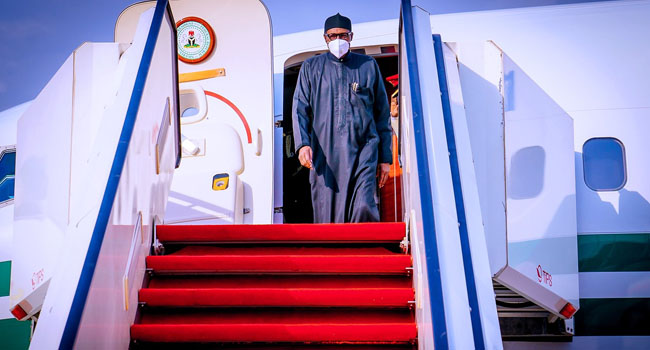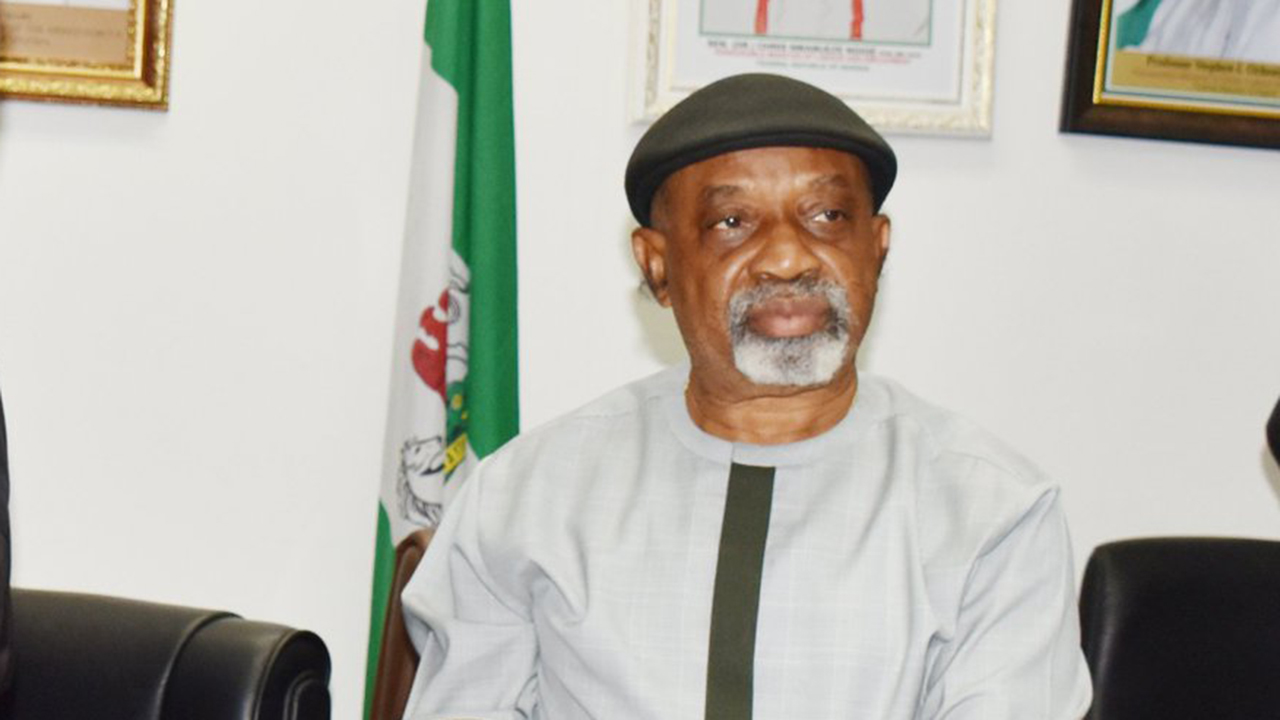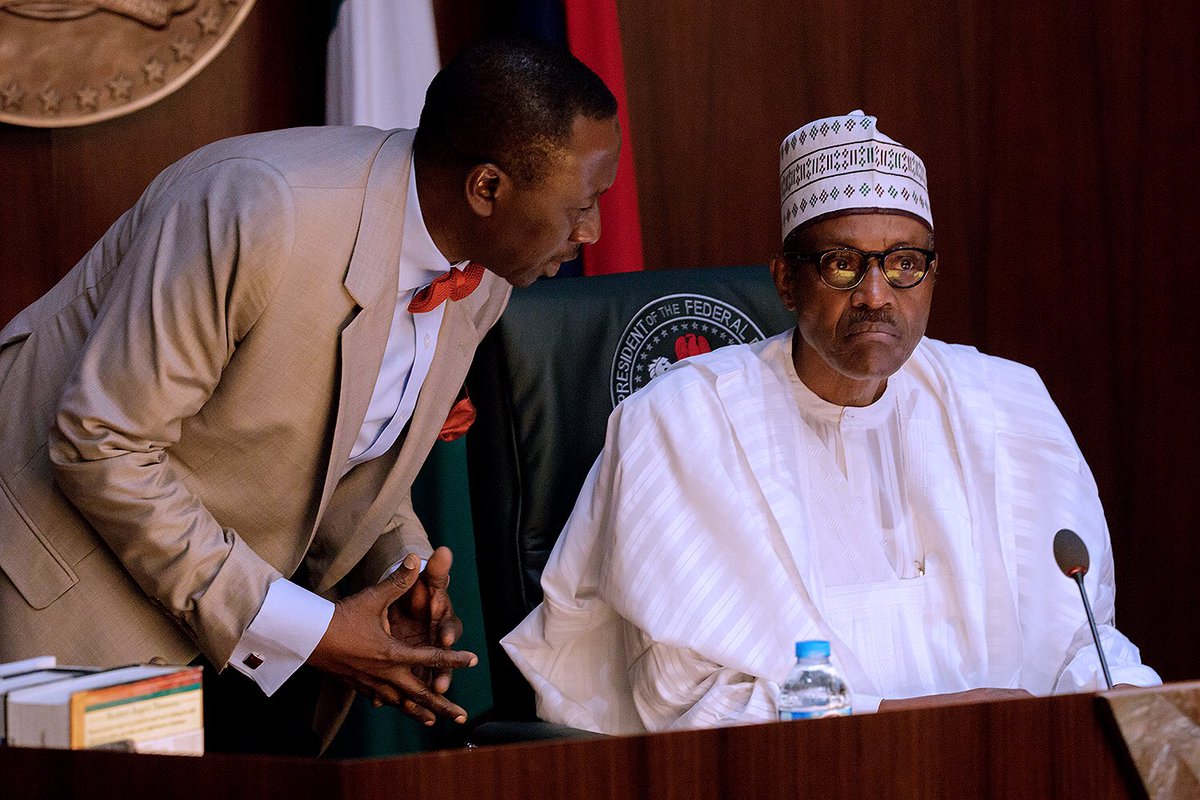President Muhammadu Buhari has made a categorical statement in his Eid-Efitri message that the battle against terrorism will be over soon.
But the haunting image of the innocent little baby born while the mother is in captivity following the terrorists’ invasion of Kaduna bound passengers trains on 28th March 2022, that was strewn on the front pages of major newspapers a few days ago (approximately one month after the mother was taken into captivity on April 28, 2022) is expected to have sent a chill down the spines of many Nigerians.
It was a surprise to some Nigerians that the picture did not really elicit the type of umbrage and disgust that it ought to ordinarily evince.
Perhaps it sent some chills down the spines of some Nigerians , but being too shell-shocked by the unceasing terrorist onslaughts, (as no day passes without reports of killing or kidnapping of fellow citizens) they may be too sapped of the milk of human kindness, and as such compelled to become less of their brother’s keepers.
If my haunch serves me right, then that is the extent to which the incredibly frightening level of insecurity has dehumanized Nigerians.
Without a doubt, the release of the photo was calculated to ignite umbrage by Nigerians such that it would compel relevant authorities to redouble efforts at engaging with the abductors of the train passengers with a view to negotiating the release of the captives.
Prior to the release of the infant’s photo, another picture of the train passengers being held hostage in the forest in excess of 30 days and nights had also been circulated. Perhaps, the release on Tuesday, April 26, 2022, of the pictures of women, men, and children (as they were manifesting various stages of despondency) while awaiting rescue from the dungeon by their governments, did not generate the public outrage against the government as anticipated by the hostage-takers; that is probably why they had to follow up with the newly born baby’s image, with the expectation that it would finally jolt Nigerians into anger.
But as l stated earlier, it would appear that Nigerians have lost their humanity hence the photo has not triggered the sort of indignation that the stealing of Chibok schoolgirls from their school dormitories, in Chibok town in Borno state in 2014 generated.
As far back as 1953, religious and ethnic crises leading to loss of lives in a heinous manner, have been besetting our country. Hence the apparent insensitivity of Nigerians to the human carnage or suffering of their compatriots perhaps stems from the high degree of degradation of lives via extreme violent acts that have been witnessed over the past half a century in the country.
To understand how Nigeria got to the current sorry state of insecurity, a bit of background will help put things in context for those unfamiliar with the saga.
When the Maitasine uprising in the Chad Basin area of Borno state and environ happened in 1980, it was the leader of the set, Mohammed Marwa, a controversial preacher of Cameroonian origin based in Nigeria that set off the riots with his fiery preaching. And he also died alongside the 4,000 – 5,000 estimated to have lost their lives in that tragedy, including his cohorts known as Yan Tasine.
But the sect leader’s death did not mark the end of religious extremism in the north. Rather, it might have facilitated its metamorphosis into variants that have more or less rendered our country prostrate in terms of productivity as farmers , fishermen and others who depend on the soil and other natural environments in the hinterland, now dread plying their trade for fear of untimely death in the hands of violent non state actors who through their reign of terror are about to render our country , comatose and of the ilk of Afghanistan, Libya etc.
The word Maitatsine, translated from the Hausa language is: “the one who damns”. The nickname is reflective of the curse-laden public speeches that (Mohamed Marwa, the sect leader) kept making against the Nigerian state.
Whereas it is the 1980 Maitatsine uprising that signposted the beginning of serious religious extremism in northern Nigeria as we know it today, it is Boko haram that has made religious Insurgency synonymous with Nigeria.
It is after the transformation of Ansaru, a variant of religious extremists into Boko Haram (Western education is taboo) in about 2009, that religious Insurgency in Nigeria acquired notoriety. In fact , it marked the escalation of active terrorism via vicious attacks launched against soft targets, in the hinterland, and a high-value one like the United Nations, UN office in Abuja.
Most people believe that religious extremists in Nigeria were emboldened by the introduction of the sharia principle governance system in some northern states during the presidency of Olusegun Obasanjo. And Sharia’s origin as governance policy was first introduced in Zamfara state, when the then-governor, now a serving senator, declared Zamfara, a sharia-compliant sub-national entity in the Nigerian federation.
In the past decade, especially in the last seven (7) years, terrorism has remarkably blossomed and become unhinged within our country, so much so that Nigeria has degenerated into a hotbed for cruelty and savagery consistent with the description of the Hobbesian state of nature. That is particularly so because it is the period that issues of religion started being mixed with politics by some politicians who were intent on playing to the gallery with the aim of reaping the benefits that are realizable from the mass appeal that aligning with religious extremists such as populism could generate. And it fits the thesis of the social scientist, Karl Marx who had in his revolutionary teachings, referred to religion as the opium of the masses . What those who elected to literally dine with religious extremists failed to take into cognizance, is that subscribing to extremism in religion is very dangerous. Simply because it is like a knife with two edges that cuts both ways.
Another characterization would be the allegory of someone riding on the back of a tiger. While riding it could be easy, the disembarkation is where the trouble lies as the rider may be consumed by the tiger when he/she alights, because by nature the tiger is ferocious. It would appear that in Nigeria after some politicians acted hand in gloves with religious extremists to gain some political advantage, the larger society is now paying the price as it is being consumed by the tiger (religious extremists) that some politicians rode on its back to ascend the throne of power.
And there are grisly images of human beings savaged by religious extremists and exponents of its multiple variants as testimonies to the assertion above.
They include humans being literarily cremated in the vehicle in which they were traveling, with the perpetrators watching the victims burned to death as it happened in Goni Usmanti Nzanai Local Government Area of Borno state on June 13, 2020. Another horrific sight that is bound to keep haunting Nigerians is the beheading of 43 rice farmers in Koshobe and Zabarmairi in Jere local government area also in Borno state on November 28, 2020. And the ripping open of guts/bowels of pregnant women by their assailants in some villages around the Benue-Plateau trough.
Are all of the above not acts of savagery capable of stripping Nigerians of human feelings?
Perhaps with the emotions of most Nigerians becoming used to being consistently violated with the gory sights of the beastly crimes earlier described, a sort of natural immunity might have taken hold of our countrymen and women such that nothing shocks them anymore.
Hence the picture of a baby born in the den of outlaws did not strike the emotional cord that could have stirred up emotions amongst Nigerians such that they could have been driven to mount pressure not only on the government to take action , but also on faith-based organizations like churches and mosques, who need to intervene by applying a soft strategy of trying to persuade the anti-social elements to halt the bedlam in our beloved nation.
In the light of the escalating human carnage and lack of encouraging signs that the end of the catastrophe is in sight, l have been advocating via media interventions, a negotiated pathway to ending the crisis. In a piece titled: Let’s Fight Insecurity Same Way We Fought Terrorism” published widely in both traditional and online media platforms including Daily Independent on December 28, 2021, l took the position that a negotiated end of insecurity in our country is imperative.
Here is how l made the case:
“At this juncture, it is worth pointing out that escalation of violence in the north via Boko Haram, mimics the trajectory of the Niger delta militancy which degenerated after authorities failed to invite for negotiations, the intellectual and genuine environmental rights agitators such as Ken Saro-Wiwa. Rather than dialogue, he was executed alongside other Ogoni leaders as felons.
Similarly, instead of having a conversation with the leader of Boko Haram whose members reportedly refused to comply with the state government’s directive to wear helmets for their own safety while riding motorbikes, he was allegedly murdered by the authorities, setting off an armed revolution threatening to overwhelm not only the north but the entire country. And the current resort to the use of force instead of negotiating with the nation of Biafra agitators like Nnamdi Kanu, and Oduduwa nation proponent, Sunday Igboho; the current occupants of Aso Rock Villa seat of power seem to be treading the same path of perdition trodden by past leaders through resort to brute military force as their preferred crisis management tool, as opposed to applying the instrumentality of negotiated settlement.”
I have good reasons for counseling our leading authorities to also try embracing dialogue as a crisis resolution strategy. The chief of which is that since it has tried and failed over the past twenty years (20) years to resolve the insecurity challenges bedeviling our country with military force, dialoguing with the aggrieved members of our society who are products, and if you like, victims of our society’s shortcomings, is a viable alternative worth considering.
The seeds of discord were likely sown in our houses of worship from where they germinated as religious extremists disagreed with or imbibed some doctrines or in political leadership styles and structures, where some members of the union allege inequities bordering on marginalization.
The analogy above implies that, in more ways than one, we are all collectively guilty of the mayhem being unleashed by the malcontents that have gone through the metamorphosis of not only becoming misfits but have gone to the extreme extent of picking up arms against constituted authorities and their compatriots, irrespective of religion or ethnicity. It is not a case of Hausa/Fulani against Igbos, Yorubas, or vice versa. But a manifestation of hatred of the discontents against society as a whole.
Relying on the oft vaunted mantra by government authorities that security is not for the military alone, l have had cause to recommend the adoption of the multi-sector and public, private partnership, PPP approach adopted for the successful prosecution of the war against COVID-19 pandemic in Nigeria, 2020-21.
This was prosecuted with the CA-COVID Initiative that saw the private sector and government pulling forces together to provide funds and strategies for combating Covid-19 pandemic.
It beggars the issuer to stare that the negative impact of the menace of insecurity is far worse than Covid-19 on society.
And private sector involvement in security is not novel in our country. Apart from the scandal-ridden Police Equipment Trust Fund promoted under president Obasanjo’s watch, a state like Lagos has leveraged the formula to guarantee the security of residents via its Security Trust Fund. And the vigilante organizations recently set up by a collection of state governments contiguous to one another for regional security have also provided some respite. Given the reasonable level of success achieved by the states and regional vigilante scheme which have actually filled in the gap created by the absence of state police, (another neglected panacea) traditional rulers and faith leaders should be similarly co-opted into the proposed negotiated settlement with amenable non state actors with a view to finding mutually beneficial resolution of the conflict with the aggrieved members of society that are clearly hell-bent on destroying our cherished country through a systematic and vicious dismemberment of its human constituents and destruction of its infrastructures including the train service, that they recently distrusted its services .
It is a no brainer to figure out that continuing with the policy or ideology of meeting force with force leads to the debasing of lives as the outlaws often launch counterattacks by venting their spleen with more cruelty being visited on defenseless folks in the hinterland where the presence of the military is hardly present to protect them. Of course , the end result is the shedding of more blood of innocent victims which has been flowing ceaselessly for no fault of theirs.
Little wonder those who survive the vicious attacks are mostly highly traumatized to the extent that when other dastardly crimes are committed against their fellow humans, their blood does not get curdled anymore, despite the extremity of the cruelty.
And it is probably the reason the sight of the baby born by a mother in the den of the outlaws failed to stir up emotions as it should have under normal circumstances.
Now, Nigerian Drug Law Enforcement Agency, NDLEA led by Buba Marwa had recently proposed that our politicians should be subjected to psychological evaluation as part of the screening exercise for those preparing to run for public office.
As preposterous as the proposition appeared, given the traumatic experience that Nigerians have been exposed to and are still enduring , it seems to me that all of us resident in Nigeria, (currently a hippodrome of dastardly acts) not so much far from the situation in Ukraine, need a psychological evaluation.
That is simply because from the leadership to the follower-ship, we all appear to have become numbed by the horrendous level of savagery reminiscent of the atrocities committed by the Vikings who were raiders and plunderers of Europe from about the 7th century up to the 9th century, and whose origin is linked to modern-day Scandinavian countries.
In the manner that the mention of Vikings instilled fear into Europeans in the 6-9th century, that is how Nigerians get gripped by morbid fear any time they hear that boko haram, ISWAP, Herdsmen militia, unknown gun men are lurking in the shadows or forests around them.
The despoiling of Nigeria by the outlaws (Boko haram, ISWAP, herdsmen militia, unknown gun men etc) especially in the northern part and southeast, as currently being witnessed in the 21st century, in my view, are reminiscent of how the Vikings raided Europe, particularly England, France and Belgium from the 6th to the 9th century until they were finally defeated by King Alfred, The Great around.
So, that validates the aphorism, there is nothing new under the sun and what goes up must come down. Simply because the type of insecurity being suffered in our clime has blighted Europe and present day UK back in the days.
Irrespective of that reality , we must be dexterous in plotting for an early end of insecurity in our beloved country so that we can have a nation to bequeath to our offsprings.
It is jarring that, in the 21st century and in Nigeria, a close scrutiny of records would reveal that rather than the rate of death arising from insecurity ebbing, it has grown exponentially.
Must we wait for as long as it took the Europeans,(6th to 9th century) through the efforts of King Alfred, The Great, to get rid of the Vikings before peace and stability can return to our country?
Apart from the barometer of deaths arising from terrorism, banditry, and herdsmen militias/farmers conflicts set up by governor Nasir El-Rufai in Kaduna state, whereby the trend is a rising statistics of those killed monthly since the tracking of the numbers commenced, a recent study conducted independently by Enough-is-Enough, a civil society organization and by Bismarck Rewane’s Financial Derivatives Company, FDC recently published in the mass media revealed that in just three months -January/March, over 1,884 souls were lost and in a period of ten years, lives in excess of 10,000 Nigerians have been consumed by the spree of violence that has engulfed our country.
That suggests that against public expectations that the reign of terror in our country would soon be over, the society’s malcontents in the form of religious insurgents, and outlaws generally, are actually having the upper hand against our armed forces.
And our society is worse for it.
To be fair , not winning the battle may not necessarily be due to incompetence on the part of the armed forces of Nigeria. But owing largely to their inexperience in prosecuting the type of warfare that the outlaws engage in, which is asymmetrical. For instance, how can the Nigerian military successfully repel the marauders that are often not gathered in large numbers in a location, that they are trained to wage war against? With the insurgents and bandits constantly moving their den or base around the forests, the armed forces are often running, as it were, from pillar to post. And in a country as vast as Nigeria,how the military always effectively engage the criminal elements in every space, how much more occupy the vast land to stave off the outlaws?
Also, how can the military guarantee that there would not be severe collateral damage via the hostages being used as shields by the enemies of the state that also hide within the society when they want to strike and retreat to the forests after they have struck?
Would there not be a backlash from Nigerians if our military forces become as reckless as the Russian military in Ukraine where civilians- from the oldest to the youngest are not being spared in their killing spree via the attacks on non military targets such as hospitals, schools, and apartment buildings which the Russian authorities are claiming are being struck because Ukrainian radicals are hiding in those complexes?
Although our country’s armed forces are not engaged in a war, which is the case in Ukraine, ( although a low tension war is afoot here ) the high risk of hitting the wrong targets is one of the multiplicity of dilemmas being contended with by our armed forces. Hence not many positive results have been recorded so far in the war against terrorism in which the actors are often ensconced within the law-abiding members of society.
Invariably, by relying too much on deadly force against the religious insurgents and outlaws, inadvertently, it appears as if our armed forces are literally chasing the bull into the China shop, with avoidable consequences.
So, how much longer must our country endure the endless gut-wrenching blood-shedding that has become the norm rather than the exception?
Clearly, given the momentum gained by the rebelling members of society that are now operating in the shadows and waxing stronger, despite the possession and deployment of some of the most lethal weapons against them by the Nigerian military, it is evident that terrorism, religious Insurgency and ethnic nationalism or secessionism can not be exterminated by sheer brute force.
The experience from Afghanistan to Libya, where multinational military forces led by the United States of America, USA were deployed and failed to stabilize the countries or end the crises, bear eloquent testimonies to the fact that seeking peace through the barrels of the guns has proven not to be as efficacious as the authorities are ready to openly admit. In the case of Libya, the US hurriedly exited after three (3) security service members were killed in the aftermath of the invasion of its diplomatic facility in Benghazi. And with respect to Afghanistan, thirteen members of its security personnel lost their lives in Kabul, as the US hastily retreated, having realized that trying to obtain peace by force was akin to trying to extract water from Rock.
As the US has realized, (better late than never ) the futility of the pursuit of peace with force, I am hoping that it would also dawn on Nigerian authorities, sooner than later, that winning the war against terrorists, bandits and other outlaws in Nigeria may not be achieved through the barrels of guns alone.
Rather the carrot and stick approach applied by president Umaru Yar’adua (2007-10) of blessed memory in quelling the militancy- manifesting in hostage-taking of oil/gas workers and destruction of the oil/gas gathering infrastructure in the Niger Delta, lends its self for adoption.
From available records, dialogue is a veritable mechanism that has hardly been explored as a solution to the rising tide of insecurity driven by religious fanaticism that has driven our country to the precipice.
If the almighty United States, US did not exercise the option of negotiating with the Taliban to exit Afghanistan where they had been an occupation force for 20 years, by now, many more lives of both Afghanistan and Americans, might have been lost.
But it got to the point that what was paramount to the Americans was to end the 20 years of US military operations in the Taliban country which came with a humongous financial burden estimated to have gulped two (2) trillion dollars at nearly three (3) hundred million dollars per day. That is not discountenancing the human cost of about 2,400 lives of members of the coalition forces, particularly the thirteen (13) members of the US military contingent that got killed when the Taliban detonated a bomb while they were making the hasty pullout from Kabul on August 30, 2021.
As part of the requirements for my master’s degree program , l wrote a thesis at the Fletcher school of law and diplomacy, Boston, USA. In it, I made a case that if the US had invested the huge sums of funds that it applied in purchasing deadly armaments for prosecuting the war against terrorism in the so-called AXlS of Evil, ( as former US president George W Bush once described Afghanistan, Syria , Yemen etc ) on food, medicines, infrastructure, and other live sustaining necessities to help those suffering extreme poverty in the region that had become the breeding ground for extremists/terrorists: perhaps the malcontents that are basically haters of Western world’s civilization , opulence, and ideology, perhaps owing to their own condition of extreme poverty, they would not have been driven to taking the extreme measure of suicide bombing, just to awaken the world to their plight via the terrorist attacks on strategic infrastructures in the Western world, by hijacking and slamming passenger airplanes into the World Trade Center towers in New York, and targeting mass gatherings of people for elimination with Weapons of Mass Destruction, WMD.
Then again, just as social scientists aver that there are no guarantees that humans would behave rationally all the time, curing potential terrorists of hunger and diseases may simply not necessarily be an efficacious panacea to religious extremism. Also, how would the defense industry of the industrialized world thrive in the absence of wars?
Clearly, fighting insecurity is a complicated matter , and often complicated issues are resolved with simple ideas.
It is noteworthy that the official reason given for pulling the US military out of Afghanistan by president Joe Biden is that it was obvious that it could not transform Afghanistan into a stable modern democracy.
Similarly, in Nigeria, after a humongous sum of funds had been invested in the war against terrorism by both the immediate past regime led by Goodluck Jonathan, and the present regime under the watch of Mohammadu Buhari, the leaders in the defense space, seem to be at their wit’s end that the mission to extricate society from the yoke of outlaws have been unaccomplished . This assessment is based on the comments attributed to both the minister of defense, general Magashi (rtd) that insecurity in Nigeria can only end via divine intervention and NSA, General Babagana Mongonu (rtd) who conveyed president Buhari’s feeling of frustration that commensurate progress has not been made despite the huge investments in the acquisition of armaments to combat the scourge of insecurity.
The weariness being expressed in Nigeria by the security apparatchiks may not be dissimilar to the conclusion reached by president Biden of the US about the war against terrorism in Afghanistan.
In fact, it is reflective and mirrors the US experience .
Apart from the statistics from Enough-is-Enough, a civil society organization indicating that about 140 men and women in uniform have been killed by the outlaws who are enemies of the state, between January to March this year, we do not have access to the records of the number of the casualty suffered by the armed forces in the course of combating terrorism and other criminalities in past ten years. Applying the principle of extrapolation, the prognosis is that the fatality figures would not be insignificant.
Also, let us keep in mind that $2.1 billion was reportedly set aside to fight Boko haram by the previous regime. But it was claimed to have been misappropriated by the former National Security Adviser, NSA, Sambo Dasuki.
When that sum is added to the approximately half a billion dollars that the National Assembly, NASS under the watch of the incumbent government, approved a couple of years ago for the acquisition of super Tucano helicopter gunships from the US, then the picture of the huge amount that our country has staked so far in the war against terrorism would come to greater relief.
It is worthy to note that the two referenced cost items are exclusive of other acquisitions of military hardwares by the Nigerian armed forces in the past twelve (12) years (combination of Jonathan and Buhari regimes) to sustain the efforts to reverse the wave of insecurity which has defied solution, 20 years and counting .
In my rough estimation, a sizable financial investment of over five (5) billion dollars might have been disbursed towards shoring up the capacity of the military to blow away the cloud of insecurity in the country which bodes no good to anyone.
In a country with an acute shortage of basic infrastructures such as roads, sea and airports, schools, hospitals, and even affordable homes, just imagine the type of infrastructure that the $5 billion expended on fighting terrorism could have provided for Nigerians in the past decade and a half?
In light of the scenario described above, in my humble opinion, it is time for our government to change its tact from pure military strategy to a multi-prong approach of carrots and sticks.
The proposition is justified by the current cul-de-sac evidenced by the frame of mind of hopelessness which our political leaders seem to be exhibiting and thd experience of the US military in Afghanistan and Libya.
Is it not time to involve our leaders in the mosques in the Muslim north and Christian leaders in churches in the south in seeking an end to the mayhem being unleashed in the name of religion via the siege being laid with the aim to annihilate as many Nigerians as possible ,and make our dear country ungovernable?
Believe it or not, it is leaders in both the traditional and religious sectors that have been neglected in the constitution of the federal republic of Nigeria, that may be capable of making a positive impact in stabilizing the polity, if co-opted into the governance calculus. My gut feeling is that it is this class of leaders, hitherto excluded from the leadership equation, that may possess the ability to bring to an end the ugly phenomenon of insecurity in our land.
In fact, the traditional institution and faith based organizations may be the missing link since they are actually the closest to the grassroots.
By virtue of their elaborate access to the critical mass of our countrymen and women, they appear to me as the best bet for rooting out the apparently intractable debacle of insecurity that by every measure has defiled military solutions.
In Rwanda, the traditional legal system, Gachacha, played a strategic role in the peace and progress being enjoyed by that country that less than two decades ago experienced one of the most horrific violence- ethnic cleansing as the two main ethnic nationalities Hutus and Tutsis engaged in the insanity of using machetes to literally butcher fellow compatriots .
Too often, we make references to how the country descended into a dark and ugly valley of nihilistic behavior . But we hardly talk about tailoring solutions to the debilitating crisis threatening to wreck our country, after the Rwandan peace model which is indigenous to Africa.
Although it might have been best if it was done earlier, it is now very auspicious to get our traditional rulers and religious leaders involved in returning peace to our beloved country. That is because that role can be assigned to them in the course of the ongoing review of the 1999 constitution of the federal republic of Nigeria by the National Assembly, NASS.
It is fortuitous that although the request by the traditional rulers for a role constitutionally recognized is one of the 20 proposals that got jettisoned from the 68 items that were tabled for debate, of which only 48 in number were approved by NASS; the need for the traditional institution and the clergy to be assigned roles in the constitution can be brought back to the table for a second look.
It is even timely since the 48 items approved are currently awaiting the concurrence of 2/3rd of the houses of assembly of the 36 states in the federation, which is a constitutional requirement. Now, it behoves the executive arm of government to nudge the legislative arm to revisit the request by the traditional institution and the clergy to be assigned roles in the constitution. That viewpoint was canvased in my article of 9th March 2022 titled: 1999 constitution review: Are lawmakers taking women and kings for granted? that was published widely in traditional and online media platforms including the CableNewsOnline.
Back in the days of our forebears, before conflicts appeared at the magistrate courts level, there must have been attempts to resolve them in the courts of the traditional rulers or leaders of churches/mosques.
That role positioned traditional institutions and places of worship currently neglected as the frontier for driving the inculcation of good characters into citizens and instilling good values in society.
Rather than place so much emphasis on Western-style solutions with huge financial and human costs, since we have to commit so many scarce funds into acquiring expensive military armaments which ultimately has the outcome of blood-shedding and boosting of the industrialized world’s defense industries, l can’t help but wonder why would our leaders are not seeking indigenous solutions to our peculiar predicaments, by looking inwards at how our forbears managed their society before the advent of Western civilization?
